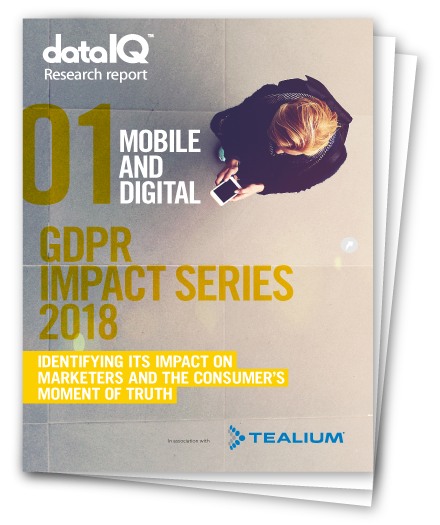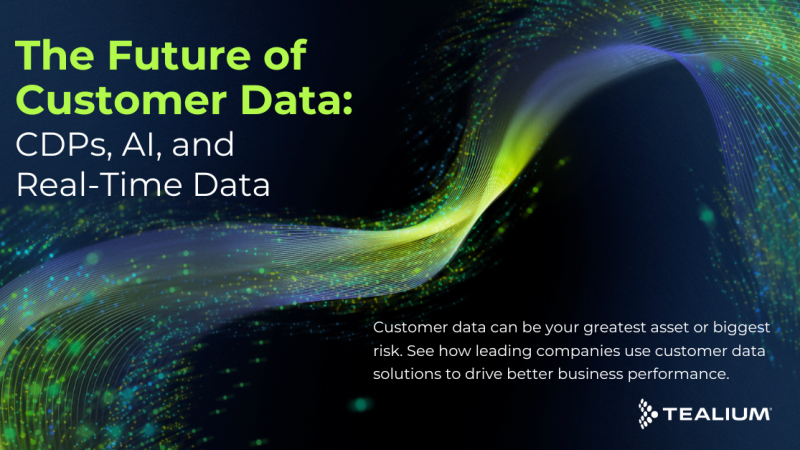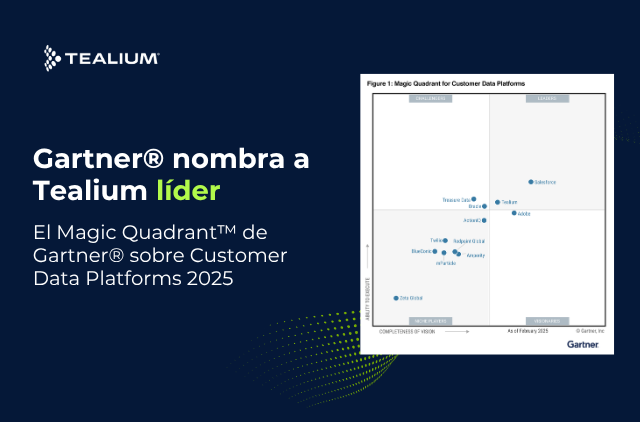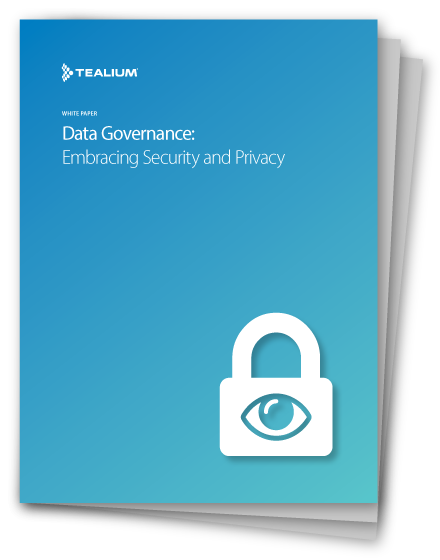El Reglamento General de Protección de Datos de la UE es una legislación europea destinada a consolidar las regulaciones de privacidad de datos en toda Europa. A pesar de estar basado en la UE, los requisitos del RGPD afectan a las empresas de todo el mundo que realizan negocios en la UE o controlan el comportamiento de los ciudadanos de la UE. Las empresas que no cumplen el RGPD están sujetas a multas administrativas de 20 000 € o el 4 % de los ingresos mundiales, el valor que sea superior. Mira nuestro vídeo para obtener más información: Tealium helps companies with GDPR by supplying data governance tools giving visibility into the collection and usage of customer data, while also supplying tools for consumers to manage their data preferences. Combined with resolving customer identity across channels and devices giving a single view of the customer, these data governance tools allow organizations to better see and manage their usage of data to improve performance and mitigate risk. In the News: Get Resources to Help with GDPR Identifying its impact on marketers and the consumer’s moment of truth Papers Browse our collection of data governance downloads to help you plan your strategy: White Paper: Data Governance – How well are you protecting your data? Download: 5-step Data Governance Checklist Videos Watch these videos to understand the data protection landscape: On-Demand Webinar: GDPR: Tactical Steps to Take to Ensure Compliance On-Demand Webinar: A Not-So Normal Webinar on GDPR: Creating your Organization’s Plan Resources Helpful resources for data protection education and planning: Infographic: European Commission Data Protection Infographic UK Information Commissioner’s Office GDPR Overview Blog: As The GDPR Approaches It May Be Time to Re-Evaluate Your Tag Management System Out of the box, Tealium has many features supporting data governance efforts to address GDPR and other data protection needs. Tealium Customer Data Hub Includes: Additionally, Tealium’s Data Governance Package is available for organizations seeking a higher level of support. Tealium Data Governance Package Add-ons: The GDPR is another reminder of how marketers, and businesses overall, need to improve their management of sensitive customer data. While market leaders have adopted a unified approach to data governance as a strategic initiative to improve marketing relevance and timeliness, the vast majority of companies are stuck managing data inside departmental or technological silos that create risk and uneven experiences. Ironically, this new regulation might be just the compelling event that will propel marketers to truly become data-driven, simultaneously allowing for data security measures and increased marketing effectiveness. Given our unique position in the data supply chain, having Tealium as a trusted partner builds confidence in your business’ ability to appropriately and legally manage data, while significantly reducing your reliance on your digital marketing and analytics vendors to adhere to privacy standards. Read our Data Governance white paper to learn more. In addition to recommended steps to building your data governance strategy, here are 12 key facts and steps that you should take to prepare for GDPR: 1. “Personal Data” is Becoming Broader – The definition of personal data will be expanded to include genetic, economic, or social identity data. 2. Compliance Required for Companies Outside the EU – Any company, regardless of where it’s based, must comply with the regulation if it deals with an EU citizen’s personal data. 3. New Special Protections for Children’s Data – Parental consent will be required, so businesses will need to implement procedures to obtain consent. 4. Getting Valid Consent – Consent must be simple and clear. Silence or inactivity will not constitute consent. 5. Data Breach Notification Requirements – Placing a greater onus on data supply chains, all data breaches potentially harming individuals must be reported to regulators and the individual. 6. The Right to be Forgotten and Access Requests – Companies will have to give individuals access to data collected in a timely manner and requires that data subjects have the right to be forgotten. 7. Mandatory Privacy Risk Impact Assessments (PIA) – There will be conditions under which a PIA is mandatory in high-risk situations. 8. Privacy by Design – Privacy in a service or product must be built in from product conception and should only collect the minimum personal data possible. 9. Contractual Requirements – Data protection will need to be clearly documented and this could impact contract negotiations for risk and security considerations. 10. International Data Transfer Concerns – The regulation also applies to data processors, so there is risk in transferring data to countries outside the EU. 11. Data Portability – Businesses have to provide data collected to subjects electronically and in a commonly used format. 12. Introduction of the Data Protection Officer (DPO) – Some businesses will need to hire or appoint a DPO to oversee data security compliance. No. Todas las empresas que se ocupan de los datos de los ciudadanos de la UE, independientemente de su ubicación, están sujetas a multas administrativas de 20 000 € o el 4 % de los ingresos mundiales, el que sea superior. Se ha especulado que Reino Unido implementará regulaciones similares después del Brexit. Los consultores de soluciones de Tealium son especialistas y están preparados para ayudarte a organizar tu plan de gobernabilidad de los datos para que puedas cumplir con el RGPD.
Digiday: ‘Only enforcement will bring change’: Ad tech responds to regulator’s GDPR warning
VentureBeat: British Airways faces record $230 million GDPR fine over data breach
TechCrunch: GDPR adtech complaints keep stacking up in Europe
Sign up to receive updates on how to implement data governance for GDPR
GDPR Impact Series 2018
don’t need to comply with GDPR?
Productos
Productos
Recopilación de datos de Calidad en Tiempo Real
Recopila datos de clientes, asegura la calidad de los datos y envíalos a cualquier lugar.
CDP en Tiempo Real e Insights Predictivos
Ofrece experiencias relevantes y confiables basadas en datos de clientes en tiempo real.
Gestión y Almacenamiento de Datos
Posee y accede a tu activo empresarial más importante: los datos de tus clientes.
Tealium para IA
Impulsa iniciativas de IA con datos consentidos, filtrados y enriquecidos en tiempo real.
Tealium Moments
Domina el momento de la experiencia del cliente con inteligencia y acción en tiempo real.
INTEGRACIONES
Overview de Integraciones
Integraciones llave en mano y flexibles en todo tu stack tecnológico de marketing.
Marketplace de Integraciones
Explora más de 1,300 integraciones disponibles.
Cloud Data Warehouse Partner Ecosystem™
Impulsa la recolección de datos y la activación en tiempo real para Cloud Data Warehouses.
Integraciones de API de Conversión (CAPI)
Soluciones para la pérdida de señal con integraciones únicas de plataformas de anuncios.
Soluciones
Roles
Casos Prácticos
Crecimiento y Adquisición
Ofrece experiencias personalizadas y relevantes y optimiza el gasto en publicidad.
Lealtad y Retención
Entiende el comportamiento del cliente tempranamente para ofrecer experiencias proactivas.
Experiencia del Cliente y Personalización
Crea grandes experiencias para el cliente con datos unificados en tiempo real.
Insights Predictivos y Análisis del Cliente
Ofrece experiencias en tiempo real a lo largo del customer journey.
Recolección de Datos y Privacidad
Coloca la privacidad y el consentimiento en el centro para construir experiencias de cliente confiables.
Vista Única del Cliente
Entiende y deleita a los clientes utilizando datos actuales y completos.
Operacionalización de Datos Móviles
Operacionaliza tus datos móviles a través de todo el ciclo de vida de los datos.
Ecosistema de Partners de intentidad
Integra y activa soluciones de indentidad para crear experiencias mejor basadas en datos.
Partners
Partners
Red de partners de Tealium
Compuesta por SIs globales, consultores, agencias digitales y soluciones tecnológicas complementarias.
Encuentra un Partner
Tealium trabaja con cientos de partners alrededor del mundo.
Únete a la Red de Partners de Tealium
Conviértete en un Partner Técnico Conviértete en un Partner de Servicios.
Marketplace de Integraciones
Explora más de 1,300 integraciones disponibles.
Recursos
 Obtén el informe
Obtén el informe
MARKETING Y ANALÍTICA
Desarrolladores
Customer Success
2025 Estado del CDP
Desbloqueando el poder transformador de la IA y los datos en tiempo real para CX
 Obtén el informe
Obtén el informe

